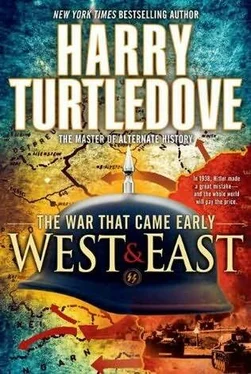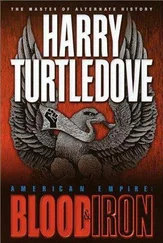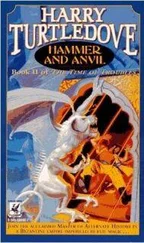Harry Turtledove - West and East
Здесь есть возможность читать онлайн «Harry Turtledove - West and East» весь текст электронной книги совершенно бесплатно (целиком полную версию без сокращений). В некоторых случаях можно слушать аудио, скачать через торрент в формате fb2 и присутствует краткое содержание. Жанр: Альтернативная история, на английском языке. Описание произведения, (предисловие) а так же отзывы посетителей доступны на портале библиотеки ЛибКат.
- Название:West and East
- Автор:
- Жанр:
- Год:неизвестен
- ISBN:нет данных
- Рейтинг книги:5 / 5. Голосов: 1
-
Избранное:Добавить в избранное
- Отзывы:
-
Ваша оценка:
- 100
- 1
- 2
- 3
- 4
- 5
West and East: краткое содержание, описание и аннотация
Предлагаем к чтению аннотацию, описание, краткое содержание или предисловие (зависит от того, что написал сам автор книги «West and East»). Если вы не нашли необходимую информацию о книге — напишите в комментариях, мы постараемся отыскать её.
West and East — читать онлайн бесплатно полную книгу (весь текст) целиком
Ниже представлен текст книги, разбитый по страницам. Система сохранения места последней прочитанной страницы, позволяет с удобством читать онлайн бесплатно книгу «West and East», без необходимости каждый раз заново искать на чём Вы остановились. Поставьте закладку, и сможете в любой момент перейти на страницу, на которой закончили чтение.
Интервал:
Закладка:
“Huh?” Hans-Ulrich knew the uncouth noise made him sound like a moron, but it was what came out of his mouth.
“Because you’re known to be loyal,” the SS man repeated patiently. Maybe he had a small child at home, and didn’t mind saying the same thing over and over again. Or maybe-since he didn’t wear a wedding ring-he’d just done a devil of a lot of interrogations. “We want to root out disloyalty wherever we find it. People whose loyalty we trust can help us do that. This colonel in charge of your squadron, for instance… Has he ever done anything or said anything to make you think he’s not doing all he can for the Reich and the Fuhrer?”
“Colonel Steinbrenner? Never,” Rudel said at once. Telling the truth was easy, and came as a relief.
“He’s replacing somebody who wasn’t reliable,” the younger SS man said, tactfully reminding his superior of something he might have forgotten.
“Ja, ja,” the other blackshirt said, not so patiently this time. If he had forgotten, he wasn’t about to admit it. “But so what? That doesn’t mean he walks on water himself, not by a long shot.”
“As far as I know, he’s a good National Socialist,” Hans-Ulrich said.
“Wunderbar. Maybe he does walk on water, then. What about the other people in your squadron?” the older man persisted. “Anybody saying rude things about the Fuhrer because the offensive’s slowed down a little bit?”
The offensive in France hadn’t slowed down. It had stopped. No matter how German radio tried to disguise that, it was obvious to anyone who spent time at, or over, the front. The Wehrmacht hadn’t taken Paris. It hadn’t wheeled around behind the city from the north: the goal in 1914 and now again a generation later. It was scrambling to try to cover its long, weak southern flank against French counterattacks. It wasn’t trench warfare of the sort that had murdered so many of the Kaiser’s soldiers, but German troops weren’t storming forward to glory right this minute, either.
Cautiously, Hans-Ulrich answered, “Nobody’s very happy about it. I’m not very happy about it myself.”
That last sentence made the older SS man close his mouth on a question. Rudel could guess what it was. He would have wanted to know exactly who was unhappy, and what the unhappy people had said. Easy to put a noose around someone’s neck with testimony like that. But the blackshirt had to see Rudel wouldn’t say anything worth hearing, not if he admitted he wished the war were going better.
“What about your crewmate, Sergeant What’s-his-name… Dieselhorst?” the younger SS man said. “Some people have told us funny stuff about him.”
“Then they’re a pack of lying pigdogs,” Hans-Ulrich answered hotly. “Nothing’s wrong with Albert-not one single thing, you hear? If it weren’t for him, I wouldn’t have come back from a couple of missions. You want to listen to the Scheisse ‘some people’ come out with, you’d better haul me away, too.”
He wondered if they would. Albert Dieselhorst loved Germany, but he didn’t love the people who ran it these days. And he wasn’t shy about saying so, which must have been why informers tipped these fellows off to him. If they had enough evidence, they’d know Rudel was protecting his sergeant. Then he and Dieselhorst would both catch it.
But the blackshirt said, “Take an even strain, buddy. We’ve got to check this stuff out, you know. It’s our job. It’s our duty.” He nodded-he liked the sound of that better. It made him seem more like a soldier, less like the secret policeman he was.
“Take him back,” the older SS man said. “He hasn’t got anything good for us.”
“Doesn’t look that way,” the fellow behind the wheel agreed. He started up the Kubelwagen, expertly turned around on the narrow road, and started east, toward the airstrip. Rudel couldn’t let out the sigh of relief that wanted to explode from him. They might notice it and know it for what it was.
The older man did have the decency to say, “Good luck to you,” when they dropped Hans-Ulrich off. The Kubelwagen chugged away. Groundcrew men and flyers stared at Rudel. If the SS arrested somebody right after this, he wouldn’t be able to live it down. The gang would have to wait and see that everyone stayed safe before they trusted him again. Sooner or later, they would… he hoped.
* * *
Sarah Goldman walked through the streets of Munster toward the only bakery in town that still served Jews. It was late afternoon: the only time Jews were allowed to shop. They got whatever was left after all the Aryans bought what they needed. It wasn’t fair, of course. Nothing had been fair since the Nazis took over, more than six years ago now.
She’d only been twelve then. She hadn’t understood all the reasons why her parents and her older brother were so upset. Well, she did now. No one who lived in Germany, Jew or Aryan, could fail to understand these days.
British bombers-or maybe they were French-had come over a few nights before. Nothing fell very close to the Goldmans’ house, for which Sarah thanked the God in Whom she was having more and more trouble believing.
A labor gang worked to fill in a crater one of the bombs had blown in the street. A gray-haired man with only one arm shouted at the men to work harder. He was probably a sergeant mutilated in the last war. Some of the men were petty criminals. Some were too old to worry about getting conscripted. None seemed inclined to work any harder than he had to.
“Put your backs into it, you lugs!” the gang boss growled. “If you don’t, they’ll put you to work in a camp.”
That made his charges speed up, at least for a little while. It made Sarah shudder as she walked by. She didn’t know what happened to people who went to places like Mauthausen and Dachau. All she knew was, it wasn’t good. No-she also knew they didn’t come out again. Her imagination took it from there: took it all kinds of unpleasant places. She shuddered again.
“Hey, sweetheart!” one of the guys in the gang called. He waved to her and rocked his hips forward and back. His buddies laughed.
Sarah’s spine stiffened. She walked on with her nose in the air. That only made the laborers laugh harder. She ignored them as best she could. She hadn’t wanted to look at them at all. She was afraid she’d see her father sweating through pick-and-shovel work. Samuel Goldman, wounded war veteran, holder of the Iron Cross Second Class, professor of classics and ancient history… street repairer. It was the only work the Nazis would let him have.
Her brother had worked in a labor gang for a while, too. Saul was a footballer of near-professional quality. He exulted in the physical, where his father grudgingly acknowledged it. And, when his gang boss rode him and hit him once too often for being a Jew, he’d smashed in the nasty little man’s head with a shovel.
He’d got away afterwards, too. Sarah didn’t know how, but he had. His athletic training must have let him outrun everyone who chased him. And the police and the SS were still looking for him. A slow smile spread across Sarah’s face. He’d found a hiding place they’d never think of.
How many of the people on the street at this time of day were Jews intent on getting whatever the hateful authorities would let them have? You couldn’t tell by looking, not most of the time. Worried expressions and threadbare clothes meant nothing. During wartime, plenty of impeccably Aryan Germans were worried and shabby, too. And Sarah couldn’t recognize Jews from the synagogue, either. Her family was secular, with mostly gentile friends; she couldn’t remember the last time she’d gone to shul.
Her father had told her he felt more Jewish now, with the Nazis persecuting him, than he ever had before. If that wasn’t irony, what was?
Читать дальшеИнтервал:
Закладка:
Похожие книги на «West and East»
Представляем Вашему вниманию похожие книги на «West and East» списком для выбора. Мы отобрали схожую по названию и смыслу литературу в надежде предоставить читателям больше вариантов отыскать новые, интересные, ещё непрочитанные произведения.
Обсуждение, отзывы о книге «West and East» и просто собственные мнения читателей. Оставьте ваши комментарии, напишите, что Вы думаете о произведении, его смысле или главных героях. Укажите что конкретно понравилось, а что нет, и почему Вы так считаете.











